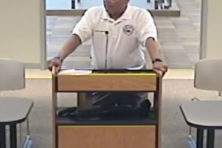Getting retirement right
- Share
- Tweet
- Pin
- Share
While some people feel content leading one full life, Dr. William Perloff is well into his third. After a first career as an engineer and a second as a physician, he is now fully involved in a third: retirement.
“My wife jokes that we will have to retire again,” Perloff laughed, “to get it right! We are far busier than we had intended to be.”
But speaking seriously he added, “Retirement is successful when you have something to retire to rather than retiring from.”
Perloff left an exciting and intense career working in the Pediatric Intensive Care Unit at UW Children’s Hospital in Madison for a gentler life in a cottage on Door County’s North Bay. He brought with him “a long list of things I was interested in spending time and energy on when I retired.”
Young Perloff’s first life began in Philadelphia with an education at Friends Central. Although the Perloffs were not Quakers, they appreciated the excellence of the school.
Swarthmore College was his next stop. “It was an important influence in my life,” Perloff said. “The school was filled with really smart people; two-thirds of the freshman class were salutatorians or valedictorians in their high school classes. I studied engineering, but most of my peers considered that an inferior course of study. It was very eye opening and helped me put things in perspective!”
Perloff entered Northwestern University’s graduate program in geo-technical engineering, earning both a masters and doctorate, and secured appointments as a professor first at Ohio State and later at Purdue University.
But at age 37 he experienced a midlife crisis. Because of the Soviet Union’s launch of Sputnik and a national emphasis to catch up, engineering professors were well paid and advanced quickly. “By age 33 I was a full professor and had essentially achieved both short and long-range goals,” Perloff said. “I had been asked to consider department chair, but had no desire to be an administrator.
“I looked for ways to apply my talents and experience in some new venue and became interested in clinical pharmacology; there are parallels in the mathematics of that field and the area I was working in. But if you don’t have an MD, you are a second class citizen!”
At that time medical schools were reluctant to admit students over 30, but Case Western Reserve in Cleveland looked for self-starters who had unique backgrounds. “I wasn’t the oldest,” he laughed. “Another guy was a year older.”
Perloff completed his residency in pediatrics, and a fellowship in pediatric critical care. He liked children and by this point had three children of his own. “I saw tremendous opportunities in pediatric critical care, as it was an emerging field at the time.”
Critically ill and injured patients, he noted, have multi-system complex problems. As an engineer he had been accustomed to dealing with complicated problems, with breaking them into simpler elements that could be managed analytically, and then re-synthesizing those elements into the complex system.
“The principles in the process are very similar to what one must do in managing patients with multi-system complex problems,” he said. His background, he believes, helped him not only become an effective practitioner, but made him a good teacher when he supervised residents and fellows as an assistant professor and co-director of the PICU (Pediatric Intensive Care Unit) at Case Western Reserve.
In 1982 Perloff came to UW-Madison to develop their program in pediatric critical care, and until his retirement in 1998, was director of the PICU at UW Children’s Hospital in Madison.
Then he and his wife Barbara moved to North Bay where they rebuilt the cottage they had purchased earlier. They loved swimming in the bay and their water view.
“Retirement is the time when you can pursue the things you are passionate about,” Perloff said. “I am a person who is passionate about a lot of things; my life has been busy!”
One of his passions is competing in triathlons. “The goal I had first was to qualify for the US triathlon team and compete in the world championship,” he said. “I have been doing that for many years, but my lifestyle was such that I could never train as regularly or as intensely as I would have liked.”
He has now qualified six times, most recently this last September when he competed in Gold Coast, Australia. Athletes are separated into age groups (he is 73), swimming 1,500 meters, biking 40 kilometers, and running 10 kilometers. He has experienced success, once placing third in the national competition, sixth last year, and as high as 11th in the world championship.
To share his love for the sport, each year he teaches a triathlon class at the YMCA for people who plan to participate in the Door County Triathlon.
Perloff is on the board of directors at the YMCA and chair of the financial development committee. “Kind of ironic,” he said, “because I hate to ask people for money, but I’ve been raising money for the Y for quite a few years!”
He is also secretary of the Sturgeon Bay Rotary Club; Barbara is also on the board of directors.
And Perloff is vice-chair of the Democratic Party of Door County. “Steve Kagen said it best,” Perloff noted, “about physicians being involved in politics. It’s not the doctors who decide whether people live or die; it’s politicians!
“It’s my belief that the political process is too important for people not to be committed to participate. I respect those who participate and have different views from me, but I find it hard to be civil to those who choose not to participate and only complain when something happens that they don’t like!”
Perloff also participates in education. Five years ago he answered a request in the Friends of Gibraltar newsletter for science tutors. Since then he has mentored high school students in math, chemistry, physics, AP biology, and statistics. “My ‘checkered background’ provides me with a variety of skills,” he said. “It’s a lot of fun; there are a lot of nice kids.”
As Perloff has experienced first hand in a PICU the things that can happen to children, he often serves as a child advocate. Currently he is chair of the Wisconsin Child Death Review Team that promotes local multi-disciplinary investigations of all child deaths (up to 17 years of age) in the state. As roughly half of those deaths are preventable, the goal is to identify ways in which similar deaths might be prevented in the future.
In addition Perloff serves as an expert witness in court cases involving abuse injuries to children.
He is also on the board, and a former vice-president, of the Wisconsin Council on Children and Families, an organization that promotes the well-being of children through education and political action as well as research. A recent focus has been working with the state legislature for changes in the juvenile justice system to account for the fact that 17-year-olds are not fully developed adults.
Through all of his lives, his family has been at his side. Dr. William and Barbara Perloff celebrated their 50th wedding anniversary last March. Their oldest son John is a real estate attorney living in Ft. Lauderdale; their younger son David, a cardiologist, lives next door to John. Their daughter Beth lives in Appleton with her husband Mike and two children, Hannah and Brady.
Perloff is excited about Beth’s work, as she deals with a subject close to his heart, the welfare of children. She has been involved for a number of years in a program that helps new parents foster the development of their infants.
Barbara Perloff, who has worked both in education and business, has just retired from the presidency of the Scand Auxiliary and their Bargain’s Unlimited shop.
Dr. Perloff is a fit, vital member of his community who continues to give to his profession and to his community. A number of us hope he will never “get his retirement right!”



